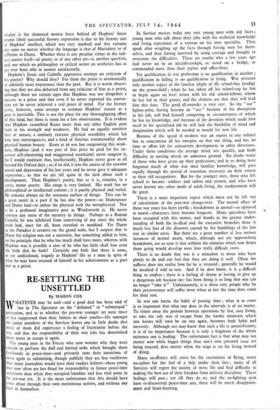RE-SETTLING THE UNSETTLED
By MAHON COX
UT HATEVER may be said—and a good deal has been said of late in The Spectator on the " defeated " or " submerged " generation, and as to whether the pre-war younger. set were more or less suppressed than then fathers in their youths—life amongst the junior members of the Services leaves one in little doubt that many of them did experience a feeling of frustration before the war, and that the responsibility of their war jobs has determined them never to accept it again. •
The young men in the Forces who now wonder why they were content to perform the dull and limited tasks which brought them livelihoods in peace-time—and privately state their intentions of never again so submitting, though publicly they are less vociferous than many journalists would have their readers believe—these young men now often are less fitted for responsibility in future peace-time conditions than when they occupied hambler and less vital posts in the pre-war era. It is the more unfortunate that this should have come about through their own meritorious actions, and without any fault in themselves. In Service messes today one sees young men with old faces ; young men who talk about their jobs with the technical knowledge and living experience of a veteran on his own speciality. They speak after weighing up the facts through having seen for them- selves, and then having survived by using courage and thought to overcome the difficulties. These are youths who a few years ago had never sat in an aircraft-cockpit, or stood on a bridge, or commanded more than their typists and office-boys.
Yet qualification in one profession is no qualification in another ; qualification in killing is no qualification in living. War presents only another aspect of the familiar plight of tge school-boy prodigy on the games-field ; when he has taken off his school-cap he has to begin again on level terms with his old school-fellows whom he has led in their games, and the chances are that they will lead him this time. The good all-rounder is very fare. So the " ace " fighter-pilot, having become an " ace " because of his absorption in his job, will find himself competing in circumstances of which he has no knowledge, and ,because of the devotion which made him excel in his specialised job he will lack the flexibility of mind and imagination which will be needed to mould his new life.
Because of the speed of modern war an expert in one subject has to concentrate all his energies on that one thing, and has no time or effort left for concurrent development in other directions. Under these conditions the average mind sets quickly, and finds difficulty in starting afresh on unknown ground. No doubt many of those who have given up their professions, and in so doing have forgotten much of what was once familiar knowledge, will pass rapidly through the period of transition necessary on their return to their old occupations. But for the younger ones, those who left school to become soldiers and sailors and airmen, and who have never known any other mode of adult living, the readjustment will be great.
There is a most important aspect which must not be left out of calculations of the post-war change-over. The mental effect of these war years has been terrific ; breakdowns in mental—as opposed to moral—characters have become frequent. Many specialists have been occupied with this matter, and thanks to the greater under- standing of both the m,:dical and the executive branches there is much less fear of the disasters caused by the fumblings of the last war in similar cases. But there are a great number of less serious instances of mental strain, which, although not yet approaching breakdown, are so near it that without the stimulus which now keeps them going would develop soon into really difficult cases.
There is no doubt that war is a stimulant to those who have plenty to do and can feel that they are doing it well. Often the sufferer does not realise how far he is strained ; generally he would be insulted if told to rest. And if he does know, it is a difficult thing to confess ; there is a feeling of shame at having to give up a dangerous job because on has been doing it so long that one can no longer take it." Unfortunately, it is these very people who by their perseverance will suffer most when at last the time does come for their rest.
In war one learns the habit of passing time ; what is to come is so important that what one does in the intervals is of no matter. To fritter away the periods between operations by fast, easy living, to take the soft way of escape from the harder moments which one knows will soon be on one again, becomes both habit and necessity. Although one may know that such a life is unsatisfactory, it is of no importance because it is only a fragment of the whole existence one is leading. The unfortunate fact is that what may not matter now while bigger things than one's own personal issue are being enacted, does matter when the stage is set for living instead of dying.
Many ex-drmen will crave for the excitement of flying, many ex-sailors for the feel of a ship under their feet ; many of all Services will regret the society of mess life and find difficulty in making the best use of their freedom from military discipline. These feelings will pass ; yet till they do so, and the ex-fighting men have re-discovered peace-time arts, there will be much disappoint- ment and heart-burning.


























 Previous page
Previous page